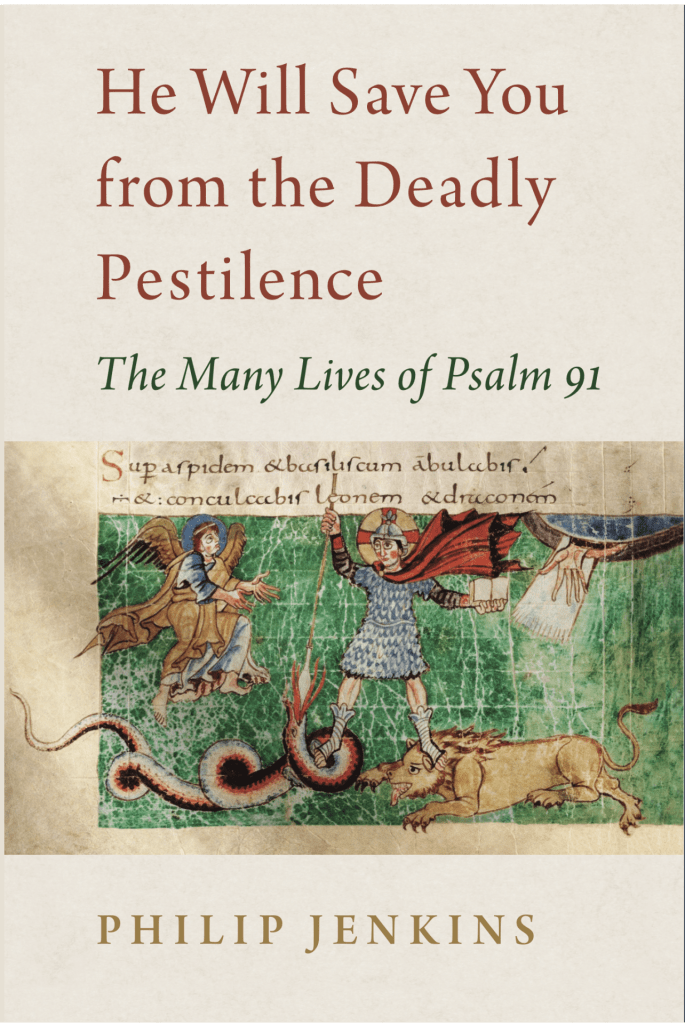
I recently published the book He Will Save You from the Deadly Pestilence: The Many Lives of Psalm 91 (Oxford University Press, 2023)
Here is the book description from the cover material:
Jews and Christians alike have made Psalm 91 one of the most commonly used and cited parts of the Bible. For over two thousand years, the psalm has played a pivotal role in discussions of theology and politics, of medicine and mysticism. In He Will Save You from the Deadly Pestilence, acclaimed religion scholar Philip Jenkins illustrates how the evolving uses of Psalm 91 map developing ideas about religion and the supernatural. Depending on the era, Psalm 91 is protective; it is triumphalist; it is messianic; it is millenarian and apocalyptic; it is therapeutic. It has shaped theories of politics and government. In different ages, it has borne many different names: the Song of Evil Spirits, the Soldier’s Psalm, and most broadly, the Protection Psalm. As the Song of Plagues, it has gained a whole new relevance in an age of global pandemic.
In the New Testament, Satan himself quotes the psalm, and ever since, that text has both reflected and shaped changing concepts of evil and the demonic. It can be read as a lesson in exalted monotheistic theology, but it was and is used for magical purposes, including for exorcism and demon-fighting. As threats have evolved in various societies, so interpretations of Psalm 91 have developed to accommodate each new reality. The psalm’s language about demons and evil forces has repeatedly come into play when Christianity encounters other religious traditions. At every stage, interpretations have to be understood in the larger context of social, spiritual, and practical concerns—indeed, a biography of Psalm 91 is also a history of critical themes in Western religion.
“Early Christians ‘thought in psalms’, writes Philip Jenkins. Few psalms were as important for them and their Jewish contemporaries as Psalm 91, and it has remained central to both Jews and Christians. This study of the psalm’s use down to the present day is a model of how to present the reception history of biblical texts.”—John Barton, Emeritus Oriel & Laing Professor of the Interpretation of Holy Scripture, University of Oxford, and Senior Research Fellow of Campion Hall, Oxford
“This remarkably informative ‘biography’ of Psalm 91 describes the many communities of Jews and Christians who have found solace, encouragement, challenge, inspiration, and more from this one biblical text. Jenkins moves rapidly from the psalm’s use before the Common Era to the help believers have found in it during catastrophes of the twenty-first century, but always with insightful attention to the circumstances in which it has been read (and prayed). It is a book of unusual encouragement.”—Mark Noll, author of America’s Book: The Rise and Decline of a Bible Civilization, 1794-1911
“Is Psalm 91 an encouragement for peace or military action? Are its words a comfort during a pandemic or incantations against an enemy? Is it a central part of monastic prayer or designed for occult practice? Philip Jenkins helps us to see this psalm as a many-sided jewel, skilfully highlighting its multiple refractions as a ‘prayer of protection’.”—The Revd. Canon Susan Gillingham, Emeritus Professor of the Hebrew Bible, University of Oxford
I have done various blogposts on the Psalm and its impact, notably this one about its uses in nineteenth century America. It was cherished in times of war and pestilence.
In his review of the book in Christian Century, Robert C. Fennell writes that:
“In generous and flowing prose, Philip Jenkins of Baylor University offers an inviting, nontechnical reading of Psalm 91 that is best described as a biography of the psalm. Focused on its reception over the centuries, through translation, interpretation, liturgy, and more, Jenkins’s study is refreshingly readable and engaging. One might think that a whole volume devoted to a single psalm would wear thin, but the opposite is true. The deeper the author takes us, the more layered and fascinating the journey becomes….
“With a gentle and lucid style, offering just enough data to demonstrate the substantial scholarship that underlies this study, Jenkins succeeds in reintroducing Psalm 91 to readers through many fresh lenses. This is historical interpretation at its best: erudite without being overbearing.”
In the Times Literary Supplement, Timothy Larsen writes that “Jenkins is a pre-eminent religious historian in the tradition of the great Jaroslav Pelikan, and He Will Save You from the Deadly Pestilence is an erudite, sweeping account in the manner of Pelikan’s wide-ranging Jesus through the Centuries.”
I did a podcast on the book on the New Books Network, with the excellent Crawford Gribben asking the questions.
